We will all face temptations.
And when we do, we must pray for God’s healing power.
Sicknesses are one of those temptations we may face.
For about a week, I noticed a spike in my blood pressure.
This has never happened before, and as usual, I am concerned.
But that’s the aim of the devil.
He strikes us with diseases to shake the foundation of our faith.
If you are dealing with any form of illness, remember Hezekiah.
Hezekiah was the ruler of Judah. He served God faithfully for years.
And then he fell ill.
God, through Isaiah, told Hezekiah that he should prepare to die.
And immediately, he prayed to God.
He said, “Remember, Lord, how I have walked before you faithfully and with wholehearted devotion and have done what is good in your eyes.”
And God heard his prayers and added 15 more years to his life.
If you are struggling with one illness or the other, there are numerous bible verses for the sick and dying.
God is able to make a change to your health status in a second.
As a medical doctor, I have seen the effect of prayers over sickness.
I have also seen God’s power over many of my patients.
Irrespective of what medical condition you are dealing with, meditate on bible verses about sickness.
God will come to your aid (Amen).
I have compiled these reassuring Bible verses to strengthen you.
Recommended for you
- Powerful Healing Prayer For The Sick
- Bible Verses About Protection from Sickness
- Prayers for parents of a sick child with Bible verses
Healing Bible verses for Sickness

Exodus 15:26
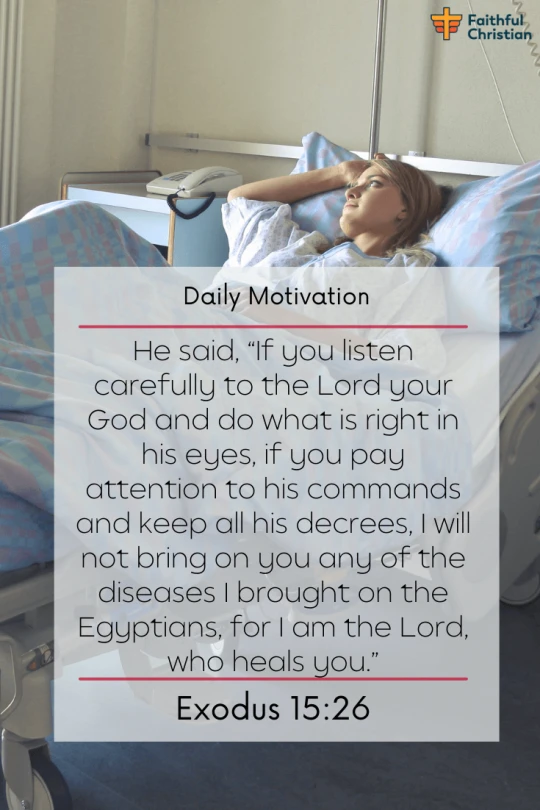
He said, “If you listen carefully to the Lord your God and do what is right in his eyes, if you pay attention to his commands and keep all his decrees, I will not bring on you any of the diseases I brought on the Egyptians, for I am the Lord, who heals you.”
In Exodus 15:26, we find a profound promise, “For I am the Lord, who heals you.” This promise offers hope, particularly for those contending with illness. It assures us of God’s readiness to heal, providing a soothing balm for our weary souls.
This verse speaks volumes about divine intervention. Just like in 2 Kings 5:1-14, where Naaman, the leprous commander, found miraculous healing through obeying the prophet Elisha’s command. Similarly, in our lives, obeying God’s commandments can lead us to experience His healing touch.
Exodus 15:26 intertwines healing with obedience to God’s commandments. A compelling correlation emerges – our spiritual health may influence our physical wellbeing. This encourages introspection: Could obedience to God’s commandments foster wellness in our lives?
The verse offers solace to those battling sickness. It comforts us that God, our divine physician, is just a prayer away, ready to restore us. The healing might be physical, emotional, or spiritual. Regardless, God, in His wisdom, provides what we need most.
Faith is a cornerstone in our healing journey. Psalm 147:3 asserts, “He heals the brokenhearted and binds up their wounds.” Trust in God, our divine healer, is crucial.
Jeremiah 30:17 echoes this, stating, “But I will restore you to health and heal your wounds.” This affirmation consolidates our faith in God’s healing promise, rekindling hope in the hearts of the sick.
In summary, Exodus 15:26 assures us of divine healing and prompts obedience, trust, and faith in God’s wisdom. In times of sickness, we find solace in His word, fortifying ourselves for the journey towards wellness. Healing may arrive unexpectedly but rest assured, it will be precisely what we need.
Acts 28:9

When this had happened, the rest of the sick on the island came and were cured.
Certainly! Here’s the updated text with hyperlinked Bible verses:
In times of illness, one can easily succumb to despair. Yet, Acts 28:9 stands as a beacon of hope amid the chaos. It exemplifies God’s power, mercy, and the promise of His healing love.
This verse echoes the story of Paul’s transformative visit to Malta. Paul healed Publius’ father, and soon, all who were ill on the island sought and received healing (Acts 28:9). This wasn’t a select act of mercy – it signified the universality of God’s healing.
James 5:14-15 further solidifies this notion. We are encouraged to pray over the sick. And the prayer of faith will save the one who is sick, and the Lord will raise him up.” This isn’t a metaphorical concept; it’s an attainable, potent power.
How does one unlock this power? Through belief. A compelling example is Aeneas’s healing (Acts 9:32-35). Paralyzed for eight years, he stood up immediately when Peter, acting in Christ’s name, told him to rise. His restoration, beyond the physical, underscored the transformative power of faith.
Our world, however, is often cloaked in skepticism. Faith-based narratives may seem unbelievable. That’s where we, as followers of Christ, play a role. We are tasked with spreading God’s healing word.
For me, this is an honor, not an obligation. When one is faced with the daunting specter of illness, God’s word serves as a beacon, illuminating the path towards recovery. By sharing healing scriptures and testimonies, we disseminate hope and assurance.
Lastly, let’s recall 1 Peter 2:24. “By His wounds, you have been healed.” This profound truth should guide our journey through sickness and health. The healing we seek has been secured, underscored by the wounds of our Savior.
Though storms may surge and winds may roar, with faith and the promise of God’s healing, we remain firm, resilient, and blessed.
Acts 19:12

12 so that even handkerchiefs and aprons that had touched him were taken to the sick, and their illnesses were cured and the evil spirits left them.
Acts 19:12 tells an intriguing tale of healing through faith. The passage talks about items like handkerchiefs and aprons transferring Paul’s healing power to the ill, and exorcising evil spirits. This narrative underlines a key concept: everyday objects acting as channels for divine healing. (Acts 19:12 (NIV))
A similar episode unfolds in Mark 6:13. Here, the apostles use oil to anoint and heal the unwell. In this context, oil isn’t a remedy itself, but a conduit for God’s healing power. Miracles spring from divine intervention, activated by unwavering faith, not from the objects per se. (Mark 6:13 (NIV))
In Matthew 9:20-22, we see faith’s power brought to life by a woman who’d suffered for twelve long years from uncontrolled bleeding.
Despite her physical anguish and societal alienation, she believed that a mere touch of Jesus’ garment would bring her healing. Recognizing her faith, Jesus granted her the healing she craved. (Matthew 9:20-22 (NIV))
I see parallels between these ancient narratives and our modern faith practices. When we pray for the ailing, we invite God’s intervention. In faith-healing services, symbolic acts like the laying on of hands or using anointed objects epitomize God’s restorative power.
Acts 19:12 and the accompanying accounts offer comfort to those fighting sickness today. They provide reassurance that God’s healing power, often manifesting in unexpected ways, remains active.
Despite illness being a grim reality, so is healing. Our faith remains our potent response, accepting what God offers – divine restoration. These healing miracles continue to testify to God’s power, spreading the gospel, and assuring us in our pain, struggle, and sickness, we are never alone.
As believers, we grasp the truth: God’s healing power isn’t trapped within the Bible’s pages. It’s active, palpable, and thriving in our world today.
Deuteronomy 7:15

The Lord will keep you free from every disease. He will not inflict on you the horrible diseases you knew in Egypt, but he will inflict them on all who hate you.
Deuteronomy 7:15 shines as a beacon of divine protection. The scripture asserts, “The LORD will keep you free from every disease,” promising solace for the faithful amidst affliction.
Consider the biblical account of King Hezekiah from 2 Kings 20:1-7. Confronted with terminal illness, Hezekiah fervently prays, his faith unyielding. Miraculously, God hears his plea and extends his life by fifteen years. This narrative underscores Deuteronomy 7:15’s essence—faith as a conduit for divine intervention.
Delving deeper into Deuteronomy 7:15, we unearth the symbiosis between spiritual and physical wellness. Psalm 107:20 encapsulates this concept: “He sent out his word and healed them; he rescued them from the grave.”
Healing transcends physical amelioration—it entails spiritual renewal, resonating with Deuteronomy 7:15’s promise of spiritual fortitude.
How does Deuteronomy 7:15 speak to us in the modern world, characterized by remarkable medical advancements yet burdened with lingering illness? This verse serves as a salve, instilling hope in our hearts. It reminds us that God’s promise of protection and healing remains potent today.
This assurance is echoed in Proverbs 4:20-22, which encourages attentiveness to God’s words: “they are life to those who find them and health to one’s whole body.” This ancient wisdom remains pertinent, urging us to lean into faith and God’s promises as we traverse our intricate world.
Finally, let’s mull over the concept of health as a divine blessing. In a world saturated with materialistic pursuits, Deuteronomy 7:15 redirects our focus towards the paramount treasure—health. It proposes that health, rather than merely the absence of disease, is a divine boon, a reward for obedience.
In sum, Deuteronomy 7:15 is not merely scripture; it’s a beacon guiding those in sickness towards healing, shining the light of faith, and echoing God’s eternal promise.
As we navigate life’s challenges, this verse assures, “I am with you; I will protect and bless you.” In these words, we find resilience and the hope to heal.
Luke 9:1
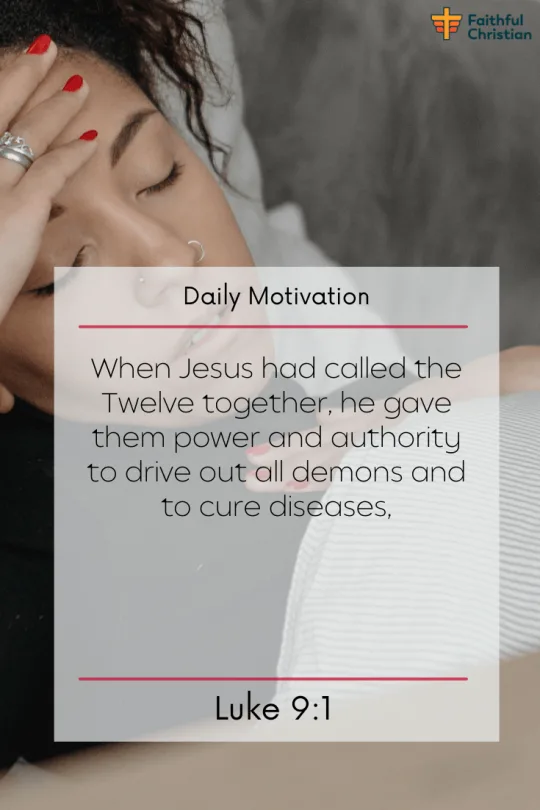
When Jesus had called the Twelve together, he gave them power and authority to drive out all demons and to cure diseases,
When we dive into Luke 9:1, a story of divine empowerment unfolds. Jesus imbues His disciples with the authority to heal and exorcise demons. This power isn’t theirs; it’s a divine gift, a tool of hope, and healing.
Let’s expand our understanding with related verses. Matthew 10:1 presents a parallel scene. Jesus arms His disciples, granting them the authority to eliminate impure spirits and cure every ailment. This verse reiterates the empowerment of Luke 9:1.
In Mark 3:14-15, we see a similar theme. Jesus appoints His twelve, giving them the authority to preach and drive out demons. This power is a divine endowment meant to serve and glorify God.
Consider the story in Mark 3:1-6. A man with a withered hand encounters Jesus in a synagogue. Jesus heals him, demonstrating the divine power He bestowed upon His disciples.
These verses underscore faith’s role in healing and exorcism. Faith is the vital conduit, allowing divine power to flow. It’s the invisible force connecting divine strength with earthly affliction.
What’s striking about these verses is the disciples’ role in manifesting Jesus’ power. They’re not mere spectators; they become vehicles of divine intervention, ordinary men carrying extraordinary healing power.
Reflecting on these scriptures, we’re confronted with the notion of authority in healing. The disciples, untrained in healing, are authorized by Jesus. They carry a divine mandate, a power transcending the natural realm.
In conclusion, these scriptures prompt us to view healing as a divine mission rooted in love and service. The disciples’ ministry underlines that faith links divine power and human need. This message offers hope to those battling sickness—faith can unlock divine healing.
Psalms 103:2-3

Praise the Lord, my soul,
and forget not all his benefits—
3 who forgives all your sins
and heals all your diseases,
Psalms 103:2-3 resonate with hope, especially for those grappling with illness. They confirm God’s steadfast dedication to our healing.
This passage positions God as our healer, reinforced by Isaiah 53:5, which proclaims, “By His wounds we are healed.” God isn’t an aloof entity. He intimately engages with our pain, healing our wounds.
Take the narrative of King David, for example. After his sins involving Bathsheba, David was burdened by guilt and spiritual distress. He sought forgiveness and, in doing so, found healing.
This is echoed in Jeremiah 17:14, which links healing with praise of God. The tale underscores God’s mercy and the transformative potential of forgiveness.
Prayer, I believe, is a powerful tool in healing. It links us to God, the supreme healer. It kindles hope and renews strength. It’s not the eloquence of words, but the sincerity of our hearts, that connects us to God’s healing.
Psalms 103:2-3 also underscores gratitude. It reminds us to acknowledge God’s goodness, even amid sickness. In expressing gratitude, we recall God’s faithfulness, enabling us to weather life’s adversities.
Finally, God’s healing isn’t one-sided. It’s comprehensive, encompassing body, mind, and spirit. This can be seen when Jesus healed the blind, the crippled, the lepers during His time on Earth.
He often addressed their faith first, acknowledging the spiritual component before the physical healing. God cares about the entirety of our well-being.
So, during sickness, scriptures are more than text. They’re God’s promises, assurance of His healing. Psalms 103:2-3 urges us to see beyond our immediate situations, recognizing God as our healer, redeemer, comforter.
In holding on to faith, engaging in prayer, accepting forgiveness, and practicing gratitude, we welcome God’s healing power. This healing operates holistically, potently, and thoroughly within us.
Matthew 4:24
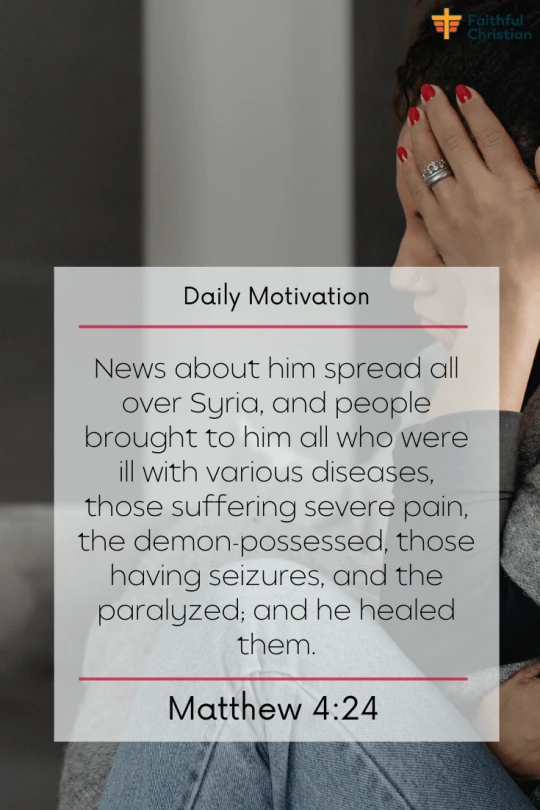
News about him spread all over Syria, and people brought to him all who were ill with various diseases, those suffering severe pain, the demon-possessed, those having seizures, and the paralyzed; and he healed them.
Matthew 4:24 vibrates with powerful implications. It paints a picture of Jesus as a universal Healer, capable of tackling a multitude of ailments. It’s an affirmation, relayed in Luke 7:22, that Jesus wasn’t just a spiritual guide; He was a restorer of physical and spiritual health.
Now, let’s delve into the spectrum of ailments Jesus healed. Matthew 4:24 encompasses everything from diseases to demonic possession, pain to paralysis. This suggests a Healer with no limitations.
Echoed in Mark 2:17, Jesus’ mission was clear: He came to heal and restore the sick and sinful, showing that divine healing addressed both physical and spiritual maladies.
Consider societal reactions. They were mixed, ranging from awe to skepticism. Jesus, however, was unphased by these reactions. His focus? Demonstrating divine love and power through His healing work, irrespective of public opinion.
Let’s look at a real-life example. Matthew 8:14-15 tells of Peter’s mother-in-law, bedridden with a fever. Jesus’ touch healed her completely. This story stands testament to the immediacy and totality of Jesus’ healing prowess.
Finally, what does divine intervention in healing mean to us? I believe it signals that God’s restorative power surpasses human understanding. It highlights the belief that in sickness, God’s healing is always within reach.
Matthew 4:24 and the linked scriptures offer comfort in times of illness. They tell us we’re never alone; we have a Healer who comprehends our suffering and can restore us.
These scriptures underline that healing is not just physical—it’s a spiritual journey towards wholeness, led by a loving God. That, to me, is an inspiring thought.
In short, these scriptures offer a beacon of hope, a testament to the possibility of healing, and an invitation to seek comfort in divine intervention.
Luke 6:17-18
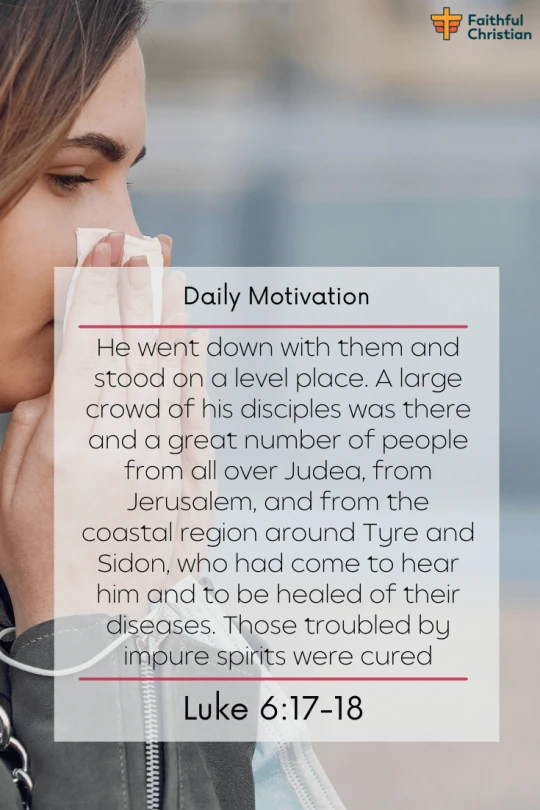
He went down with them and stood on a level place. A large crowd of his disciples was there and a great number of people from all over Judea, from Jerusalem, and from the coastal region around Tyre and Sidon, 18 who had come to hear him and to be healed of their diseases. Those troubled by impure spirits were cured,
The Bible verse Luke 6:17-18 presents a compelling narrative about Jesus’s healing prowess. It reveals how faith plays a key role in accepting His healing. The verses offer a potent message – His healing is for everyone. The narrative binds together healing and preaching and emphasizes both spiritual and physical recovery.
Envision the scene: Jesus standing on a level place, a great crowd gathered from all corners of Judea, Jerusalem, and the seacoast of Tyre and Sidon. They had come to hear Him and to be healed of their diseases. This passage illuminates Jesus’s extraordinary healing power.
But this isn’t just about physical wellness. Matthew 9:35 expands on this. Jesus wasn’t merely a healer of bodies. He mended spirits, changed lives, signaling a transformation encompassing the entire being.
Let’s ponder on the significance of faith. I ask you to recall the ten lepers’ tale (Luke 17:11-19). Marginalized by society, they pleaded for Jesus’s mercy. Their faith led to their cleansing. Notably, one returned to thank Jesus, finding spiritual, not just physical, healing.
Jesus’s healing isn’t exclusive. It’s universal. He reached out to all, restoring physical health and spiritual wellbeing. This is a tapestry of society. His ministry eradicated boundaries, inviting everyone to His healing grace.
This universality resonates in Acts 5:16. The apostles, endowed with Jesus’s healing power, were approached by crowds for healing. Jesus’s healing was, and remains, open to all.
Reflecting on the intertwining of Jesus’s healing and His preaching, we find a crucial connection. His preaching wasn’t just about future salvation. It was about a fulfilled, abundant life in the present. He repaired bodies and spirits, indicating the imminent Kingdom of God.
In moments of despair, Luke 6:17-18 offers solace. We’re reminded of Jesus, His healing power, His message. These verses emphasize that His healing is accessible to all who believe. I urge you to cherish these verses. Faith and hope in His healing continue to manifest miracles today.
Mark 1:34
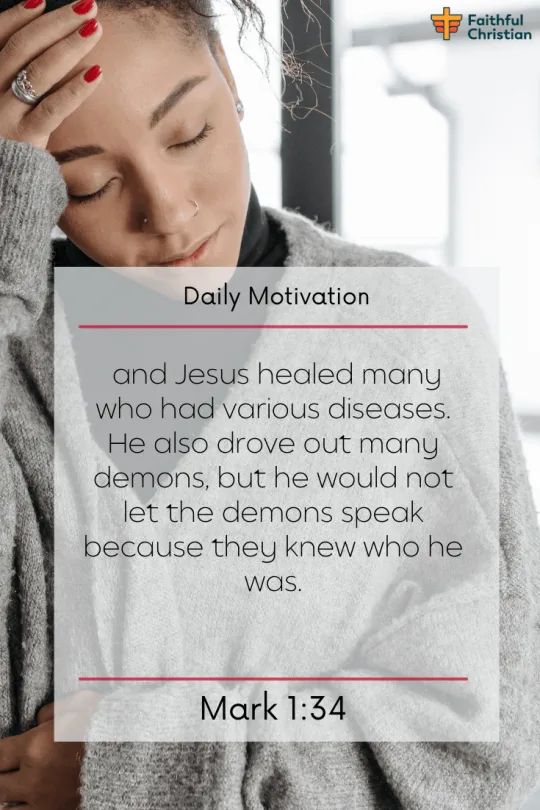
and Jesus healed many who had various diseases. He also drove out many demons, but he would not let the demons speak because they knew who he was.
In the bible, we find a collection of stories, with Mark 1:34 shining as an emblem of hope. It paints a portrait of Jesus, portraying His divine authority over illnesses and demons. This verse serves as a beacon for those in sickness, inviting them to seek solace in Jesus’ healing abilities.
Jesus’ healing miracles were a cornerstone of His ministry. The narrative of the demon-possessed man in Mark 1:21-28 is a vivid example. In this account, Jesus confronts an unclean spirit, commanding it to leave the man. I view this as a demonstration of His power over both physical and spiritual realms.
His miracles drew diverse seekers. The ill came from varied backgrounds, united in their hope in Jesus’ healing. His love and power, as evidenced through these stories, transcended societal barriers.
These miracles also confirmed Jesus’ identity. Each healing served as a testament to His divine nature, validating His role as the promised Messiah. As such, His healings were a cornerstone of God’s plan to reveal Himself to the world.
Finally, Jesus’ miracles underscored the arrival of God’s Kingdom. As recorded in Luke 4:43, Jesus stated that preaching this good news was His purpose. His healings embodied this message, offering hope and redemption to believers.
Thus, for those seeking healing Bible verses in times of sickness, Mark 1:34 stands tall. It symbolizes Jesus’ authority, compassion, and the hope we can find in Him. Supporting verses like Luke 4:41 and Acts 10:38 amplify this message, solidifying Jesus’ role as a divine healer.
Trusting in Him during times of need can lead us towards healing and wholeness. The healing narratives remind us of His accessible, transformative love, presenting a source of hope and comfort during adversity.
Luke 4:40
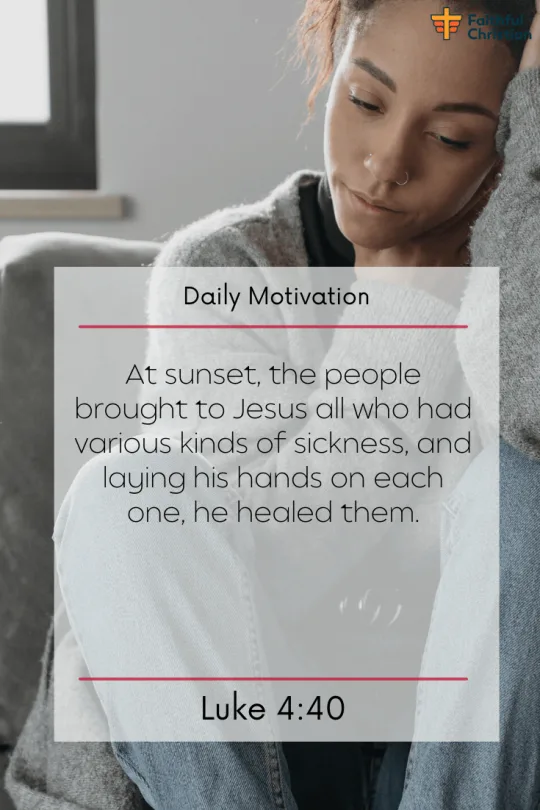
At sunset, the people brought to Jesus all who had various kinds of sickness, and laying his hands on each one, he healed them.
At the heart of life’s challenges, especially sickness, lies the quest for hope and comfort. In response, we turn to scriptures like Luke 4:40, illuminating the depth of Jesus’ compassion and his healing power.
The verse reads: “And when the sun was setting, all they that had any sick with diverse diseases brought them unto him; and he laid his hands on every one of them, and healed them” (Luke 4:40, KJV). The context here is the start of Jesus’ ministry, marked by His readiness and keenness to bring healing to those in need.
Parallel to this in Matthew 8:16, Jesus’ divine power is emphasized: “When evening came, many who were demon-possessed were brought to him, and he drove out the spirits with a word and healed all the sick.” Remarkably, His healing required only a word or a touch, showcasing the potency of divine intervention.
Mark 1:32-34 further echoes this diversity in Jesus’ healing. Whether fever, possession, or unclean spirit, He healed all. This broad-spectrum healing demonstrates His encompassing love and power, transcending the boundaries of physical ailments.
Interestingly, these events unfolded as the sun was setting, marking the end of the Sabbath. This daring act, seen as contentious by some, reflects Jesus’ unwavering commitment to compassion and service, emphasizing that divine love and power are not constrained by human traditions.
In conclusion, Jesus’ healing approach was holistic, addressing both spiritual and physical elements, as in the story of the centurion’s servant in Luke 7:1-10. Here, faith was integral to the healing, underscoring the interconnected nature of the spiritual and the physical in Jesus’ healing ministry.
In times of sickness, let’s take solace in scriptures like Luke 4:40. These verses remind us of Jesus’ enduring compassion, divine power, and holistic healing. Our hope remains steadfast in Him, the healer of yesterday, today, and forevermore.
More bible verses about healing the sick
Recommended for you
- Powerful Healing Prayer For The Sick
- Bible Verses About Protection from Sickness
- Prayers for parents of a sick child with Bible verses
Frequently Asked Questions
What are the healing scriptures for the sick?
The Bible is a resplendent trove of scriptures, offering solace to the sick. Prominently, Exodus 23:25 stands out, promising God’s blessing and removal of sickness for those who serve Him.
In similar vein, Psalm 107:20 spotlights God’s transformative power through His words, emphasizing His healing prowess.
What are the Bible verses for healing and strength?
When it comes to empowerment and healing, scriptures like Isaiah 41:10 provide reassurance, asserting God’s support and fortification. Additionally, Jeremiah 33:6 is a beacon of promise, assuring the arrival of health and tranquility.
What are the Bible verses about healing sickness in the King James Version (KJV)?
In the King James Version (KJV), one finds profound verses like James 5:15, illustrating the recuperative power of prayer. Matthew 4:24 highlights Christ’s healing miracles, affirming His ability to restore health.
What are the Bible verses about pain and suffering?
Verses such as Romans 8:18 provide comfort in the face of suffering, casting it against future glory. Another profound passage, 2 Corinthians 4:17, shines a light on our temporary troubles in the grander scheme of eternal glory.
What is the Bible verse for a sick family member?
When seeking solace for a sick relative, James 5:14 and Psalm 103:2-3 can offer guidance. These scriptures urge the invocation of church elders for prayer and celebrate God’s healing and forgiving nature, respectively.
What are some short Bible verses for healing and strength?
Compact yet potent, Psalm 30:2 and Isaiah 53:5 carry powerful affirmations of God’s healing ability. These verses encapsulate God’s willingness to assist and heal us.
What are the Bible verses for the sick and dying?
In the face of terminal illness, 2 Corinthians 1:3-4 offers consolation, and Psalm 34:18 promises divine proximity to the broken-hearted. Both are sources of comfort and hope.
Is there a prayer for the sick mentioned in a Bible verse?
James 5:15 outlines a prayer for the sick, stressing the restorative power of faith-filled prayer and the assurance of God’s forgiveness.
Which Psalm is for health and healing?
Psalm 103, rich with references to God’s benefits, including healing of diseases, is a standout when seeking health and restoration.
Is Psalm 91 a prayer for healing?
While primarily a Psalm of protection, Psalm 91’s assurances of divine safeguard can extend to encompass healing, particularly in verse 3.
What is the strongest prayer for healing?
The powerful prayer expressed in James 5:16 accentuates the potency of the prayer of a righteous person, qualifying it as a strong contender for the strongest healing prayer.
What Psalm is comfort in sickness?
In times of sickness, Psalm 23 offers comfort, especially with its fearless affirmation in the face of death’s valley.
How do I pray to God for sickness and healing?
James 5:14-15 provides a blueprint for praying during illness, promoting collective prayer and anointing by church elders. The Lord’s Prayer (Matthew 6:9-13), invoking God’s will on earth, is an exemplary personal prayer model during times of sickness.
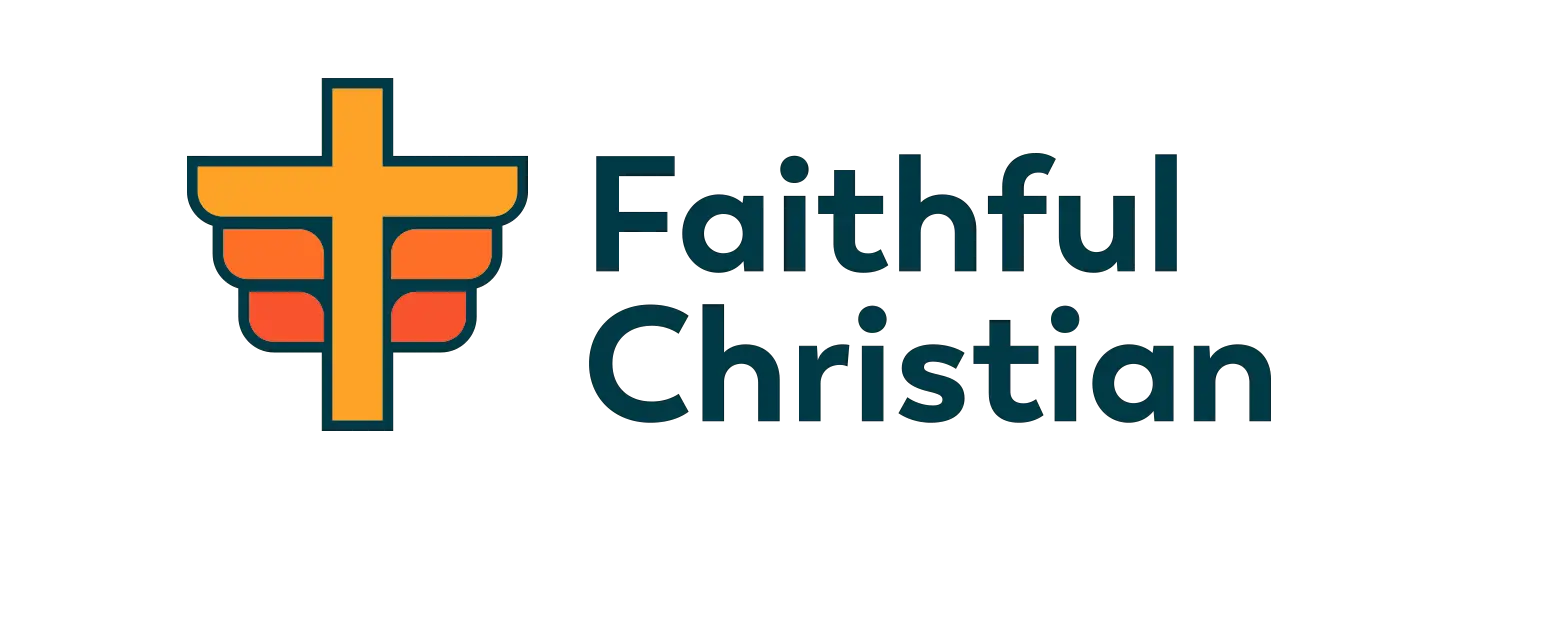
Allison
Saturday 16th of July 2022
Exactly what I needed to read thank you
Happiness Chinenye
Thursday 16th of December 2021
Your Comment Here... Thanks for making me have hope again. Keep it up, because it heals a dieing soul.
Wordi Gabriel
Sunday 17th of October 2021
I Really loved this very helpful